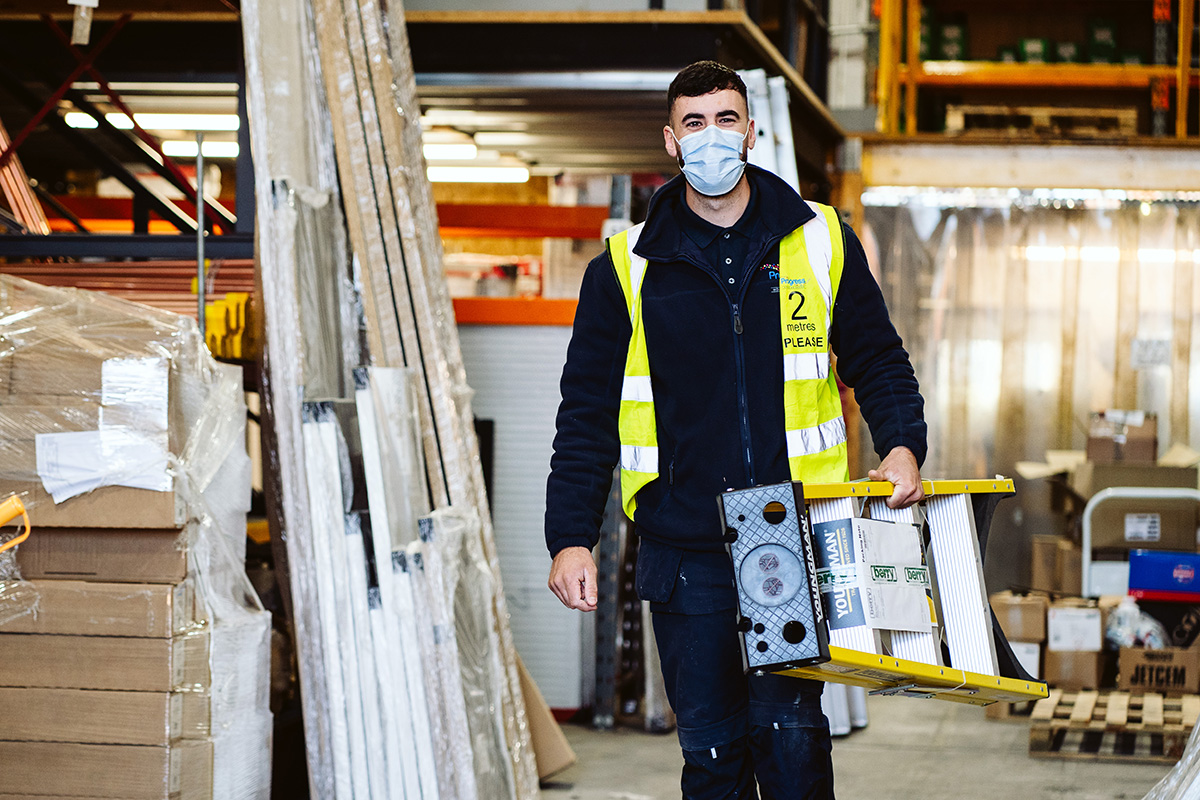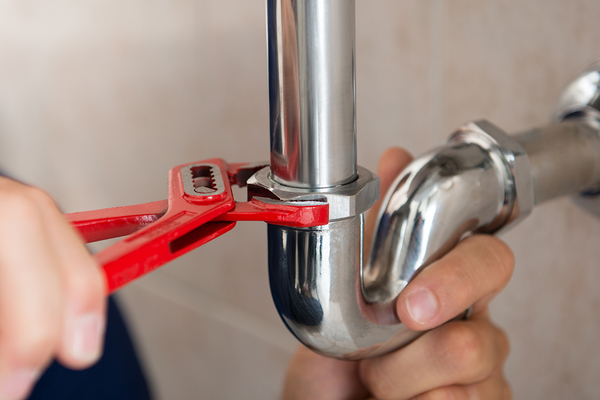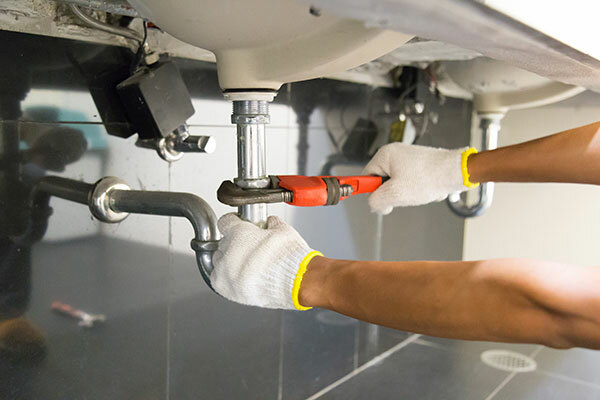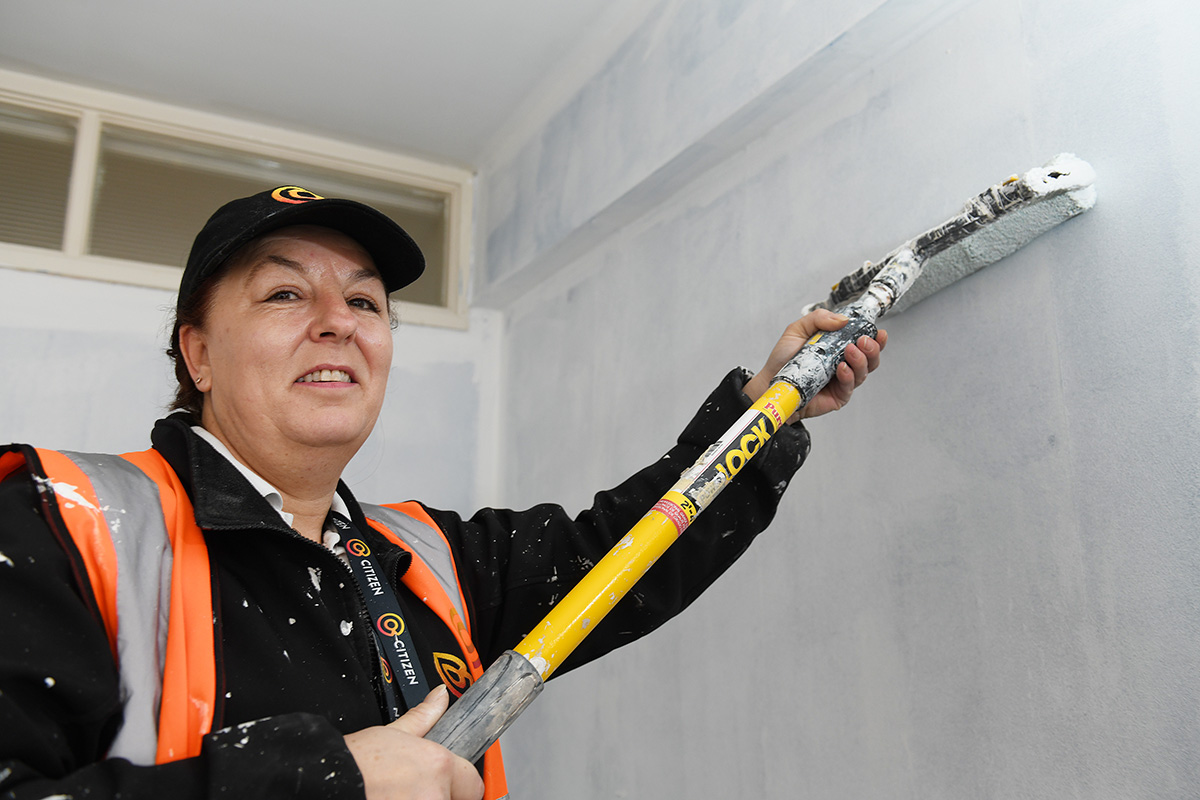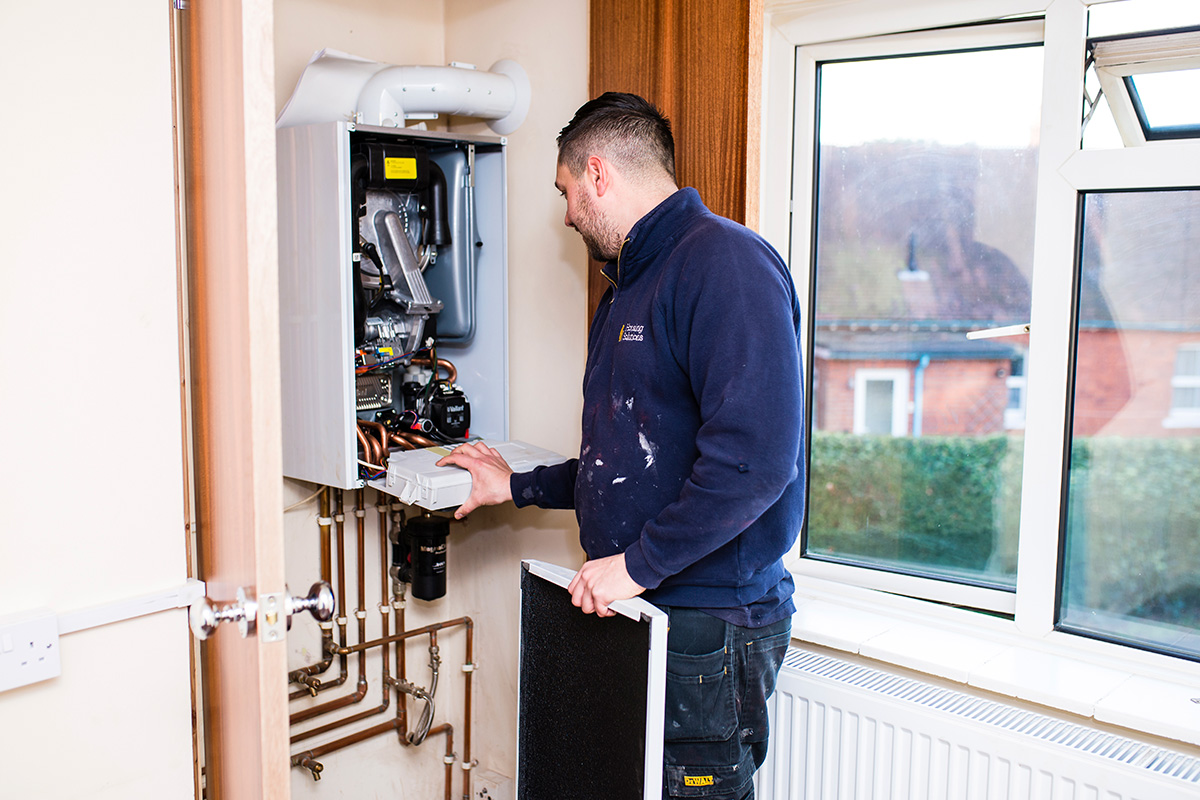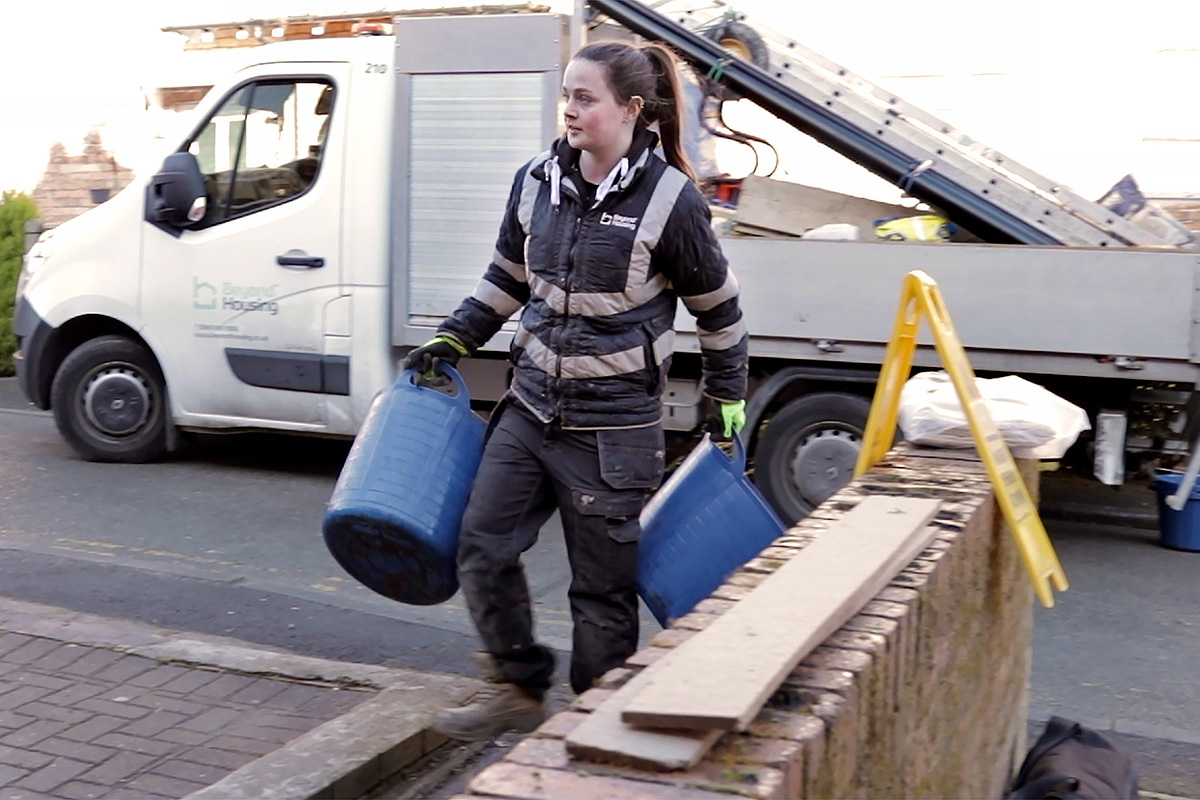You are viewing 1 of your 1 free articles
Planned maintenance: what is the COVID-19 impact?
Despite having to push back maintenance jobs during lockdowns, some landlords say they do not have a backlog. Jess McCabe finds out how they have been able to continue works and how coronavirus has affected them. Photography by Adam Riley, Rich Kenworthy and Golden Light Photography
Above: Workers from Progress Housing Group wear personal protective equipment when attending repairs appointments
The country may be in lockdown, but repairs teams are still out fixing emergency problems. Social landlords have largely managed to keep going with the most urgent repairs throughout the COVID-19 pandemic, and now many are doing routine works as well.
With landlords also facing an expensive and urgent list of fire safety works that must be completed, Inside Housing investigated what the long-term impact might be. We spoke to dozens of housing associations from across the sector to find out.
In January, the Direct Works Forum – which represents the in-house repairs services of social landlords – surveyed its members to find out the status of their repairs operations. What that survey found is a pretty predictable breakdown of activity.
Gas servicing continues as “business as normal”, as do activities that do not involve contact with tenants – fixing up empty homes and grounds maintenance. But 40% of respondents have a reduced repairs service and 37% reduced work for investment and capital maintenance.
“We’ll still be providing all key maintenance services in a post-COVID world”
To give a more concrete example of what this looks like, consider Plus Dane Housing. It had a plan to replace 475 kitchens in 2020/21, but by December it only delivered 70 – mostly in empty homes.
That sounds significant, but landlords tell Inside Housing that they are pretty confident they are either on top of repairs or something close to it. In particular, many of them stress that fire safety works have carried on throughout the pandemic.
“We’ll still be providing all key maintenance services in a post-COVID world,” says Karin Stockerl, director of asset strategy and services at 45,000-home Optivo. “We’re expecting minor delays to investment programmes, like kitchen and bathroom upgrades, due to COVID-19. We’re continuing to prioritise emergency and essential repairs, which are being carried out within our usual timeframes.”
“We’re using this time to paint and decorate empty properties, to raise the standard of those homes for our new residents”
Some landlords share numbers to help quantify what delaying works during the pandemic means. Karbon Homes says it has 6,500 repairs on its system – about 2,000 more than usual.
Eastlight Community Homes has a similar number, although property director Charlotte Todd expects that to rise. “The backlog of around 2,000 routine jobs would take us a couple of months to catch up,” she says.
“However, we’re aware that there is likely to be an influx of repairs and maintenance work being reported by our customers as soon as the current restrictions are lifted.”
Most social landlords, including Citizen, continue to carry out essential repairs work
Eastlight is one of many landlords that has made changes to what work is being carried out and how. “Fencing work was not considered a priority last year, as we caught up on previous backlogs caused by lockdowns, so our team members are working outside, catching up on those jobs,” Ms Todd says.
“We’re addressing lower priorities, such as weeding communal lawn areas. We’re also using this time to paint and decorate empty properties, to raise the standard of those homes for our new residents.”
“The last thing we would want would be for a customer to be left without a fully working bathroom or kitchen because of increased restrictions or a localised outbreak”
First Choice Homes Oldham has made a similar change: bringing forward roof work it intended to carry out at a later date and delaying work that is intrusive to residents, such as damp proofing. Steve Mather, director of operations, says the 11,570-home landlord has spent about 85% of what it had projected this financial year.
Even though repairs work now has the legal OK to continue, some landlords are still erring on the side of caution. As Steven Grocock, head of asset management at 7,000-home Raven, notes: “We have put any kitchen and bathroom renovations on hold to mitigate incurring any problems in the middle of a job, which would cause significant disruptions to residents. The last thing we would want would be for a customer to be left without a fully working bathroom or kitchen because of increased restrictions or a localised outbreak.”
Some organisations are using lockdown to paint and decorate empty properties
Nathan Cronk, director of asset management at LiveWest, is one of many repairs bosses shying away from the idea that there is any sort of backlog.
“We did not stop undertaking important fire safety work at any point during the COVID-19 lockdowns and, as a result, there is no backlog caused by the pandemic. Other non-urgent works, such as our kitchen and bathroom programme, were paused during the first lockdown,” he says. “We have reprogrammed and reprioritised these works to ensure we address the most important jobs that were paused during lockdown.”
“Fire safety and zero carbon are absolutely fundamentally moving the dial about how an organisation’s finances fit together. Even if you’re relatively unaffected by fire safety, you are still entirely affected by zero carbon. The sums you had in your long-term plan may not be fit for purpose moving forward”
Julian Chun, director of property and strategic services at 31,000-home Vivid, also says that works have paused but does not want to call this a backlog. “Having done little to no planned programmes for about three months in lockdown one, and one month so far in the current lockdown, it could be suggested that this is creating a backlog. However, we don’t have a backlog on our planned programmes per se.”
Jon Slade, a director at consultancy Campbell Tickell, is not surprised by the confidence that most landlords have in their programmes. “Planned maintenance is an elastic subject. Gas safety is not elastic at all; you must service the gas boiler and insulation every year. But whether you clean the gutters of the block of flats this year or next year, you’re not going to get told off by the regulator by not doing it in a particular year,” he notes.
A Housing Solutions worker carrying out a gas safety check. Such work has continued throughout lockdown
However, there is an impact on delaying this work, he says. Some of that is financial – if you put off replacing kitchens and bathrooms, you will spend more doing one-off repairs. Resident satisfaction comes into this, too. This is hard to quantify, but if a communal hallway has not been redecorated in a while, this might not cost money but might affect how tenants feel about their landlord.
As Mr Mather points out: “Fundamentally, we have identified that our customers are still positive about receiving investment, repairs and compliance works to their homes and they are happy to allow us access.”
When it comes to the impact of fire safety work, most landlords have set aside extra money, rather than relying on their repairs budgets to cover these costs. Ian Johnson, director of property services at Karbon Homes, sums this up: “We haven’t had to rearrange anything. We have continued to invest in customers’ homes and funded the fire safety work with additional money so the planned programme wasn’t impacted.”
Some associations have restructured how their repairs programmes operate – 35,000-home Abri has created a fire safety delivery team solely to concentrate on this work. Colin Gallaugher, director of commercial services at Abri, says: “This team will deliver maintenance, upgrades and improvements to take our stock to the highest standards over the next five years. We will also be improving our stock with smarter fire alarm systems, modernising door-entry systems and ensuring these homes are safe, warm and energy efficient in line with our zero-carbon by 2050 commitment.”
Housing associations, such as Beyond Housing, are focusing on maintenance works that take place outside in order to limit contact with residents
So repairs teams are still working away, but that does not mean there is not something significant going on. Mr Slade says: “What they will be worried about is the bigger question of have they got enough money allocated to repairs? Most organisations are worried that for many years, they knew how much they needed to look after existing buildings and the rest of the budget went on development. The chief executive is having to have a difficult discussion with the development director.
“Fire safety and zero carbon are absolutely fundamentally moving the dial about how an organisation’s finances fit together. Even if you’re relatively unaffected by fire safety, you are still entirely affected by zero carbon. The sums you had in your long-term plan may not be fit for purpose moving forward.”
On top of fire safety and zero carbon, Mr Slade says that there are “strong indications” that in England the revised Decent Homes Standard will include stipulations on public spaces, which may turn some jobs into work landlords cannot delay and put pressure on their budgets.
Landlords may be confident they are back on track, but there are sure to be more changes on the horizon.
Some images used here were taken before the pandemic.
Sign up for our asset management newsletter
Already have an account? Click here to manage your newsletters
